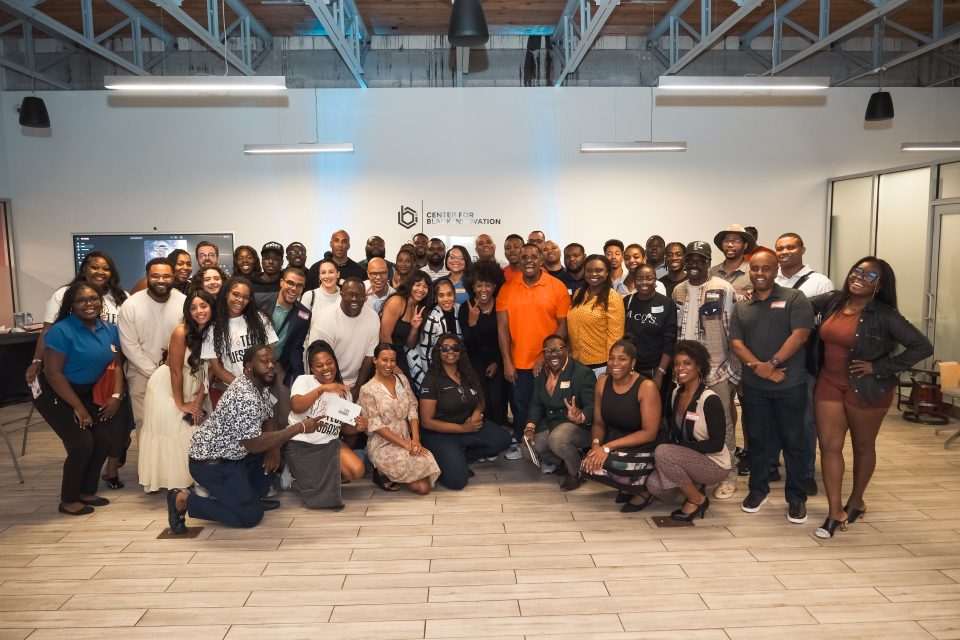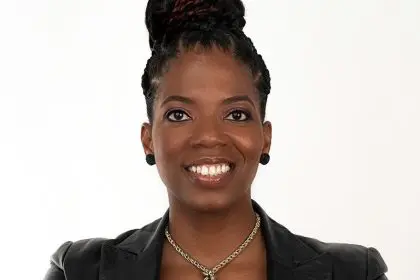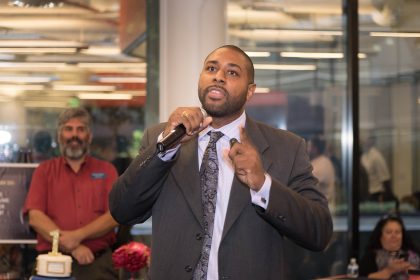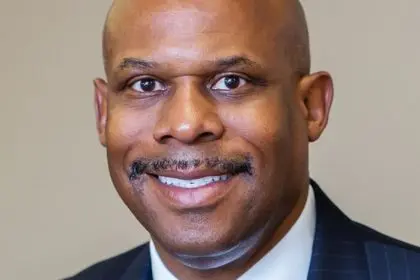
Silicon Valley technology veteran Hilmon Sorey has witnessed firsthand the evolution of barriers that once seemed insurmountable for aspiring entrepreneurs. With three successful exits as an executive, investments in over 117 startups, and partnerships in 2.12 Angels venture capital firm, Sorey brings a wealth of experience from the heart of tech innovation. Now based in Miami, he’s co-founded The Source, downtown Miami’s innovation hub dedicated to driving more diverse participation in the tech industry. His mission extends beyond traditional mentorship, he’s actively working to democratize access to technology and capital through education and practical application.
What would be the title of your speech to business graduates entering today’s AI and venture capital-driven market?
“Staying Agile.” I think that one thing that is critically important now is for people to understand how to be nimble, how to pivot, how to move with the flow of technology. When I say technology, I don’t just mean technology as it’s applied, AI, machine learning, crypto, those things. There’s a certain technology being applied to finance right now as well, which is critically important.
Understanding all of your options. My father used to tell me when I was young, don’t do anything that cuts off your options. Ensure that you always have a place that you can move. I think that’s what’s most critical. I think that why a lot of people might be scared in this marketplace is because they feel as though those options are becoming more limited when, in fact, I think barriers to entry are being lowered like they never have been before.
What are three specific barriers of entry that you believe are allowing entrepreneurs to move and pivot at a quicker rate?
In my space, which is technology, has been for the last 35 years of my life, one significant barrier to entry for our community has been the fact that we are not typically coming from programs in high school or college that were computer science degrees, or we have not typically had the opportunity to excel in science, technology, engineering, and math. These technology careers that were high paying, or those folks who became founders. You think of the Bill Gates. You think of Elon Musk. You think of Steve Jobs all the way down the line. You think of all of these folks who make up the top 7 of the richest people in the world. They all came from some background with respect to engineering and coding. Well, the advent of AI has really reduced that barrier to entry to the point at which AI is actually doing the coding for you.
You can articulate a prompt logically, in plain English and a few other languages that can actually create software on the fly. So where our community has been strong and identifying cultural opportunities as well as identifying problem solving in a very different way. We now have opportunities to access technology in a way that we never have before.
Speaking about technology, you’ve got this whole world of DeFi, which is basically anti-finance. You do not have to go to Wharton and deal with someone who’s in private equity, or deal with the institutional lender who is pattern matching you against anyone who may have come before you, and every bias in the world inside of their brick and mortar confines. Almost anonymously, you can get access to funding for your company through a DeFi structured blockchain that allows you to get access to capital.
There are so many opportunities that may have begun as micro opportunities. Chicago was built upon micro communities, and you had your corner store that did its thing. I think that one thing that’s very interesting is that the tapestry of the world is also a number of micro economies now, and if you understand how to leverage that, if you understand how to solve a problem or cater to one of those communities, you can build a business in a way that you never could 25-30 years ago.
How should entrepreneurs reimagine the economy based on these new financial options like nano banking and fintech innovations?
This is why we exist, down here in South Florida, Ted Lucas and I founded The Source, which is an entity that is considered a black-owned innovation hub, down here in Miami. One of the biggest barriers, particularly for our community to any of this conversation is not having the language and not knowing what these terms mean and how they’re being used. Sometimes that is used exclusively, it’s used in finance all the time. There’s all acronyms and terms that people use, and only the folks that are at Bear Stearns or JP Morgan clearly understand how to use these to actually transact business when they don’t mean anything complicated, we just haven’t been told the definition. So something like DeFi is just a shortened term for Decentralized Finance, meaning, I don’t have to go to one place to do my banking. I can do it all over the place, and when you start breaking these things down, and when you provide on-ramps to folks who have the sophistication and have the interest and have the understanding of business, but not necessarily the understanding of these terms. That’s when you really create access.
We have a program called Tech Tuesdays that happens every Tuesday where folks can come together and meet, and it doesn’t matter where you are on your learning path around these things, you can get together and talk about these things, whether you happen to be an expert or whether you can’t even spell AI. We’ve got other opportunities at historically black colleges and universities like FAMU, where we’re offering folks opportunities to get into things like B2B tech sales, and the first 2 weeks of that course is all just vocabulary, it’s like, let’s just demystify this. What’s amazing to see is how people’s eyes open up and they get illumined once they finally get the vocabulary and they’ve harnessed that, and now they can put their own sauce on it and turn that into a business opportunity, turn it into a job opportunity.
What would two ideal candidates gain from participating with The Source in terms of mindset and network?
The 2 things you just said are key. First is mindset, where it is a challenging mindset around like, hey, this is something you’re capable of, and we don’t make excuses here. It cannot be that I didn’t learn this in high school. It cannot be that only some percentage of us are getting funded. What we do is we say there’s one you, you have one company. You don’t need a trillion dollars in investment. You need $250 to get started.
So let’s get you on that path, and let’s make sure that you have a supportive environment that allows for you, with experts who have done this before, to be able to imbue you with both the network, as well as the education to be able to get ahead rather than making the mistakes that any entrepreneur makes. Most successful entrepreneurs will tell you that they have had a mentor, whether formal or informal, that has helped clear cut the path. I think part of our responsibility, those of us who have had the opportunity to be in some of these rooms at the highest level, is to reach back and to provide an accelerated format for doing that.
We’ve got a program running now, called SPARC, which is called the Startups Pitch Accelerator Regional Competition. It is specifically geared towards folks who are thinking, I want to be an entrepreneur. I want to give this thing a shot, and they are on some level of moving along, but they want the advice they want the mentorship, whether it’s around sales, whether it’s around marketing strategy, whether it’s around, how to build a product, whether it’s even around, how to vet whether not your idea has legs. So we gamify it a little bit which creates this opportunity for you to develop a bunch of peers, and they get behind you, and you’ve got all this wind beneath you that carries you forward.
Not everybody wants to be an entrepreneur. Some folks got the CEO as a job. So the other critical element here is, how do I job skill, upskill, reskill, ensure that I’m relevant going forward in my company? I think there are a lot of folks in middle management who are saying AI? Just when I was about to get to my senior level, this thing’s coming along. So we work with some folks to understand how to leverage this as a tool, not perceive it as a threat, and be the person in your organization who is welcoming technology and able to use that to level up as well.
How can someone enter the SPARC competition and what should they expect?
You can go to sparcsouthflorida.com, and there is all of the application information there, as well as information on the contest that we ran last year. I should mention that the winner of this has a chance to go to San Francisco to compete with other organizations around the world for a chance to win a million dollar investment, but it’s not just about the investment, it’s about the education.
You should be prepared to be around folks who are passionate about solving problems. This is the one thing that I’ve noticed about successful entrepreneurs that I’ve worked with is that they have identified a problem, either they’ve experienced it themselves or they’ve experienced it with a family member, or maybe in a workplace environment, and they couldn’t get it out of their head. They can’t sleep at night without thinking about how to resolve that thing, and they live and breathe it.
What’s interesting is being an entrepreneur is a very lonely pursuit until you realize there are countless others just like you. What’s fantastic about that is, you get the peer knowledge of somebody else who may have experienced that, or maybe a little further along than you, or maybe a little further behind that you get to impart some advice to, and then you also get that tutelage from some folks who did go to Wharton, and some folks who have invested in multiple hundreds of companies over the last number of years, folks who have been in Silicon Valley to be able to imbue you with all of their expertise and their network as well.
What’s the time commitment and cost for the SPARC program?
It is a light lift, as most accelerators go, with the intention being that you’re a busy entrepreneur, you’re doing other things, and we get that. So the commitment is virtually, we provide about 7 hours of mentorship and expert advice, instruction that you can tap in, live, and if you’re live, obviously your questions get answered of that mentor. If you can’t, then you can watch it later, watch the replay and still get the information from that specific course and that level of subject matter expertise.
Then there are 3 days of actual live activity down here in Miami. So we have a happy hour on the 21st of August, on the 22nd of August we do a demo day where you actually get to showcase your product or your service or your technology to the general public. Last year we had about 500 people come through there, as well as judges who might be among them. Then the next day the top 10, as judged by that organization, get to the actual pitch competition, and that’s judged by VCs, and judged by other entrepreneurs who have had successful exits.
Zero. Free ninety free.
What’s your background that validates your expertise in this space?
I grew up in Chicago, I moved to San Francisco, I lived there for 25 years. I was fortunate enough to be a CRO 3 times with 3 exits, all in the web security space except for one which was in professional services. From that I was able to become an angel investor. As an angel, I’ve invested in over 117 startups at seed stage. 15% of those in the minority community, and another 10% of those as women, some both women and minorities, some just women. In addition to that, I’m a partner in 2.12 Angels, which is a seed stage venture capital firm based in San Francisco. I also run a global go to market strategy firm based in San Francisco, New York, Johannesburg and Miami. That specializes in sales and sales management for technology organizations. I’ve worked with folks that range from Salesforce to SurveyMonkey, Billboxx.com, DigitalOcean, FreshWorks, and the list goes on over the course of the last 12 years.
I think that what I learned from that is that there is a responsibility that I have in this chapter of my life to ensure that I’m paying it forward, and that I am leveraging all the benefits that I got to be able to create entry points and grease the skids for other folks who have great ideas, great ambition and need that access or need that information. That’s what I’m here to do every day.
What books do you recommend for brain food from a CEO perspective?
Let’s start with the Bible as a book that you should read. The Bible, what’s important about it, that among many things, if we’re talking about this from a CEO perspective, is that it helps you to understand and maintain the humility and sense of purpose, and without that guiding sense of purpose, nothing else matters. You could read all the books on how to be a billionaire, how to win friends and influence people, how to shift this, change that, how to lean startup. None of it matters if this thing right here isn’t right. I spend a lot of time revisiting the types of books that replenish my soul more so than the books that make me tactically adept at some point solution to business.
A second book that I think is really important, that helps you separate that concept of yourself from that thing called your mind, which is constantly yakking at you about stuff telling you, oh, you’re not good enough, or oh, that thing that a teacher said to you before you’re not supposed to be math, or you’re not supposed to be that, or watch out, for those people don’t go into that. All that stuff is just happening in your head, and your mind is no more, all of you, than your hand is all of you. So, being able to separate that, I think, is one thing that’s critical. There’s a book called The Untethered Soul, which I revisit on a regular basis, because it is a practice of mindfulness that helps you separate from that.

















